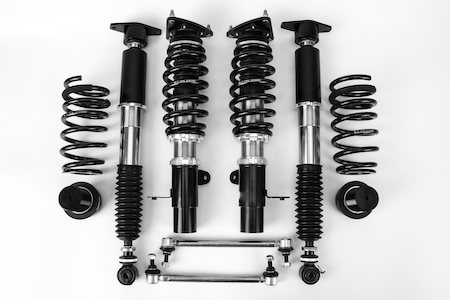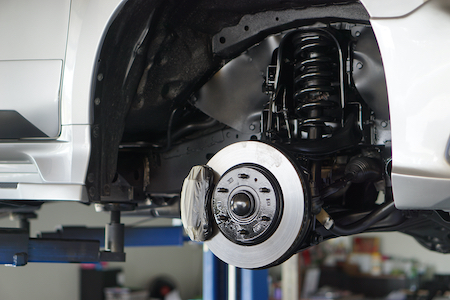When you head out for a drive, you expect a smooth ride. When you hit a bump, you barely notice it, and continue along.
Unless your suspension has problems.
The suspension system includes shock absorbers, struts, springs, and tires. Each component works together to smooth out the bumps in the road. If one part is weak or failing, you’ll feel it.
How the suspension system works
Performance vehicles love to focus on power. Manufacturers will talk about torque, horsepower, and zero-to-sixty acceleration.
But performance doesn’t mean much if you can’t control the car. Without a suspension system, you’d never be able to handle those performance features. It’s required for both handling and comfort of the passengers.
If all roads were straight lines, flat with no bumps or curves, your vehicle wouldn’t need a suspension. That’s not the case. Driving is all about stopping and starting, merging into traffic, and turning to get to your destination. It’s a series of movements – some planned, some not – to get you to where you’re going.
The suspension system is built into the chassis, which includes all of the main parts of the car located beneath the body. It includes:
- The frame – the structural component of the car
- The suspension – supports the weight and absorbs the shocks associated with driving
- The steering – gives you full control over the vehicle’s direction
- The wheels and tires – motion and grip of the road.
The major components also include:
- Springs, which provide support and control the load and height of the suspension
- Shocks, which absorb and dampen the energy from the tires as they connect to the road
- Anti-sway bar, which shifts the movement of your wheels relative to the steering wheel
When you hit a bump in the road, it forces the wheel to move up and down relative to the energy within the bump. Smaller bumps will barely be noticeable. Larger bumps transfer a lot of energy. This energy is absorbed by the suspension system, which means none of the force makes it to the passenger compartment.
What happens when your suspension system has problems
If the suspension system works well, your car will handle well. As various components of the suspension system wear out, you’ll feel it in different ways.
Bouncing when you hit bumps in the road
Hitting potholes, slowing for speed bumps, navigating dips in the road – it’s all a part of your typical commute. If you start to feel each pothole, speed bump, or dip, it might be a sign of a suspension problem. This bouncing movement starts when your shocks are worn out. Shock absorbers are designed to help dampen the impact of movement in the suspension system, and help control the workload of the springs. When the shocks wear out, the springs are left to do all of the work. It’s this excessive spring action that creates the bounce.
Play in the steering wheel
The steering function is interrelated to the suspension system. If the suspension fails, the vehicle will be more likely to wander from side to side rather than continuing in a straight line. It’ll feel loose as you steer and keep it between the lines. This can also be caused by poor steering alignment, so it’s important to bring it in for inspection to determine where the problem originates from.
Dipping while braking
When you hit the brakes hard, you should feel every system respond and move into action. It’s a tight process that keeps you safe in emergency situations. If you have a problem with the suspension system, however, you may notice the front of the car dips down when you hard brake, the tightness loosens up a bit. This is a sign you need new shocks. It’s a sign they no longer are doing their job.
Vehicle leans when it’s parked
Have you ever performed a “flight check” before you drive your car? It’s a good idea to walk around it every once in a while to ensure all systems appear to be working well. This gives you a chance to look at the tires and notice anything that appears to be off. If you notice one corner leans down, lower than the other corners, it’s a sign of suspension failure. An easy way to notice a problem is to focus on the way the tires sit in the wheel well. The space between the tire and the bodywork should be the same on all four sides.
Pulling to one side
Have you noticed your car pulling to one side or the other while you drive? It’s a sign of a suspension problem. When you’re traveling down a straight road, it should take little effort for your car to stay moving forward. You’ll feel a pull if there’s a problem. It could be a tire that is softer than the other three; it’s pressurized differently. If you notice it more while driving around corners, it might be an alignment problem.
A noisy ride
Your car is designed to block out the noises of the road. When parts start wearing down and failing, they’ll create unique sounds. When you start to hear a repetitive squeaking or clunking noise coming from under the hood, it’s usually a sign of a suspension part failing. Like other components on your vehicle, the suspension will last anywhere from 50,000 to 100,000 miles. Check your owner’s manual for details on when you can expect to replace each part. If you’re nearing end-of-life for any major part, a proactive approach would be to replace it sooner rather than later. This ensures it never fails at an inopportune time.
Summary
A car’s suspension system is just one of many crucial components to give you a safe, comfortable ride. Without a suspension system, you’d face each bump with more force, and have more risk on your drive.
To ensure your suspension system is in good working condition, schedule an inspection with a certified mechanic at the first sign of trouble. It’ll protect you from further damage, and ensure a better drive.


 Imagine heading out on the open road, and pushing the pedal to the floor to reach 60, 70 miles per hour and more. What gives you control is your suspension system. What makes it a comfortable ride at every speed is your suspension system. Without it, you’d quickly spin out of control.
Imagine heading out on the open road, and pushing the pedal to the floor to reach 60, 70 miles per hour and more. What gives you control is your suspension system. What makes it a comfortable ride at every speed is your suspension system. Without it, you’d quickly spin out of control.